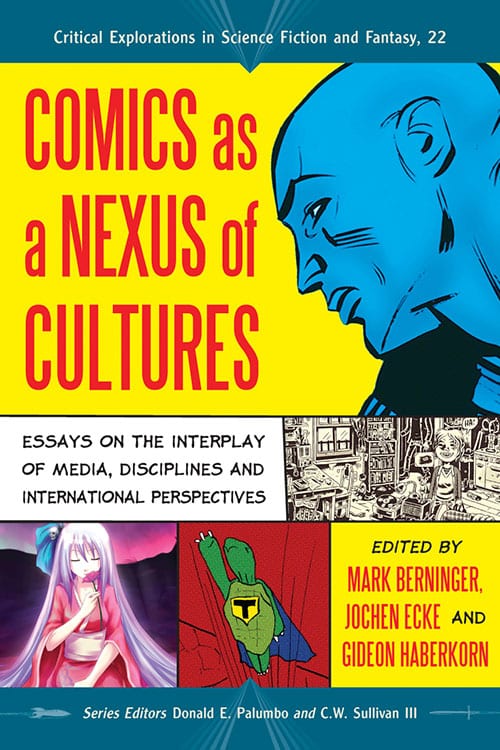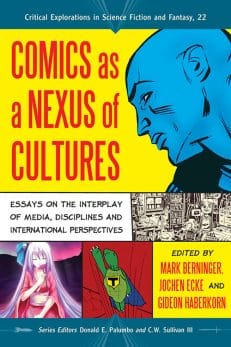Comics as a Nexus of Cultures
Essays on the Interplay of Media, Disciplines and International Perspectives
$39.95
In stock
About the Book
These essays from various critical disciplines examine how comic books and graphic narratives move between various media, while merging youth and adult cultures and popular and high art. The articles feature international perspectives on comics and graphic novels published in the U.S., Canada, Great Britain, Portugal, Germany, Turkey, India, and Japan. Topics range from film adaptation, to journalism in comics, to the current manga boom.
About the Author(s)
Bibliographic Details
Edited by Mark Berninger Jochen Ecke and Gideon Haberkorn. Series Editors Donald E. Palumbo and C.W. Sullivan III
Format: softcover (6 x 9)
Pages: 308
Bibliographic Info: 29 photos, notes, filmographies, bibliographies, index
Copyright Date: 2010
pISBN: 978-0-7864-3987-4
eISBN: 978-0-7864-5587-4
Imprint: McFarland
Series: Critical Explorations in Science Fiction and Fantasy
Table of Contents
Introduction 1
INTERMEDIAL
1. Spatializing the Movie Screen: How Mainstream Cinema Is Catching Up on the Formal Potentialities of the Comic Book Page (Jochen Ecke) 7
2. The Marvel Universe on Screen: A New Wave of Superhero Movies? (Andreas Rauscher) 21
3. From Trauma Victim to Terrorist: Redefining Superheroes in Post–9/11 Hollywood (Dan A. Hassler-Forest) 33
4. “Picture This”: Disease and Autobiographic Narration in the Graphic Novels of David B and Julie Doucet (Jonas Engelmann) 45
5. Novel-Based Comics (Paul Ferstl) 60
6. In the Art of the Beholder: Comics as Political Journalism (Dirk Vanderbeke) 70
INTERNATIONAL
7. The Carrefour of Practice: Québec BD in Transition (Michel Hardy-Vallée) 85
8. The Use of Allusion in Apitz and Kunkel’s Karl Comics (Sandra Martina Schwab) 99
9. Cultural Specifics of a Scottish Comic: Oor Wullie (Anne Hoyer) 108
10. Memento Mori: A Portuguese Style of Melancholy (Mario Gomes and Jan Peuckert) 116
11. Otherness and the European as Villain and Antihero in American Comics (Georg Drennig) 127
12. 2000AD: Understanding the “British Invasion” of American Comics (Ben Little) 140
13. Whatever Happened to All the Heroes? British Perspectives on Superheroes (Karin Kukkonen and Anja Müller-Wood) 153
14. A Cornerstone of Turkish Fantastic Films: From Flash Gordon to Baytekin (Meral Özçınar) 164
15. From Capes to Snakes: The Indianization of the American Superhero (Suchitra Mathur) 175
16. The Roving Eye Meets Traveling Pictures: The Field of Vision and the Global Rise of Adult Manga (Holger Briel) 187
17. Kawaii vs. Rorikon: The Reinvention of the Term Lolita in Modern Japanese Manga (Dinah Zank) 211
18. Mangascape Germany: Comics as Intercultural Neutral Ground (Paul M. Malone) 223
INTERDISCIPLINARY
19. Workshop I: Toward a Toolbox of Comics Studies (Karin Kukkonen and Gideon Haberkorn) 237
20. Workshop II: Comics in School (Mark Berninger) 245
21. Workshop III: Teaching Comics and Literary Studies—Neil Gaiman and Charles Vess’ “A Midsummer Night’s Dream” (Mark Berninger) 253
22. Workshop IV: Teaching Comics and Film Studies—Ang Lee’s The Hulk (USA 2003) (Andreas Rauscher) 265
23. Comic Linguistics: Comics and Cartoons in Academic Teaching (Christina Sanchez) 274
About the Contributors 283
Index 287
Book Reviews & Awards
“recommended”—Choice; “an extremely informative and useful contribution”—Studies in Comics.






